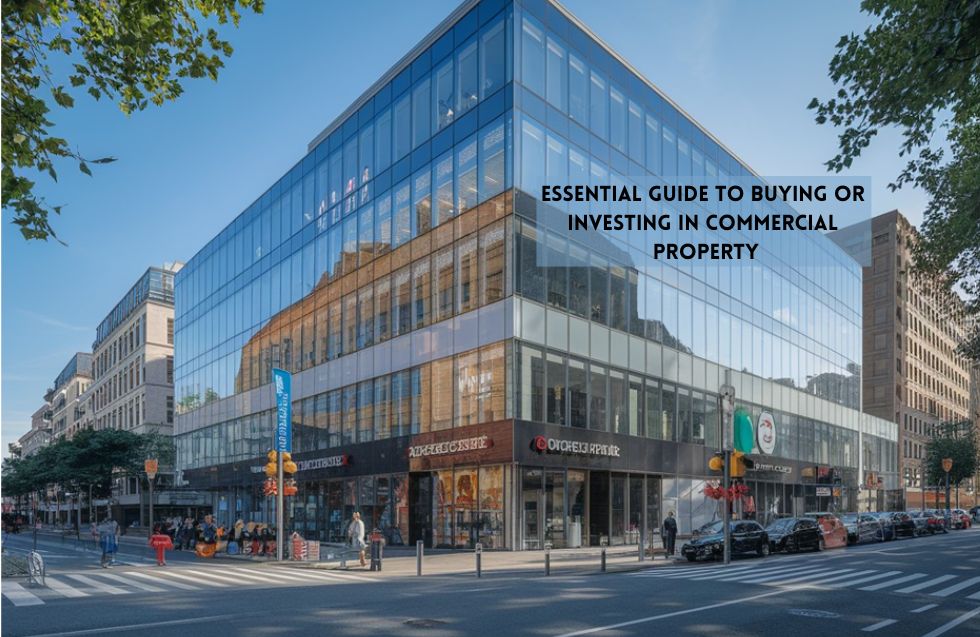Reasons for Investing in Commercial Real Estate
Investing in real estate has always been rewarding, although commercial properties investment tends to yield the highest returns. Be it an advanced real estate investor or a novice buying your first property, commercial premises have the potential to improve your finances, provide steady rental income, and maximize the value of your investment portfolio
On the other hand, effectively learning how to invest in commercial properties is important because it’s just as essential as its potential returns. From selecting an ideal location to studying the market, everything needs to be thought through. In this textbook, we will guide you through the steps you need to take so that the investment brings you profits.
Major Considerations When Purchasing Commercial Properties
The Nature of Commercial Real Estate Covers Many Different Types Of Properties Commercial Real Estate in One Country/Economy Are Characterized by Multiple Types of Commercial Properties
It is critical to understand the different types of commercial properties as businesses operate differently when making commercial property investments. The primary classifications of commercial real estate assets include the following:
Office Buildings: Executive offices, multiplication, and business machines centers.
Commercial: Shopping centers, kiosks, and independent shops.
Industrial: Storage buildings, plants, and freight terminals.
Multi-Family Buildings: This includes apartment buildings or mixed-use
buildings.
Hospitality Properties: includes hotels, motels, and holiday rentals.
Recognizing these properties will enable you to make a more informed investment choice contingent on your projection. For a step-by-step breakdown of commercial real estate loans, explore our Commercial Mortgage Guide to ensure you make the right investment decisions.
Location Matters – Getting the Right Region
The location of commercial real estate is key in determining its feasibility. Issues such as its location, roads, and other facilities, as well as what is nearby, can affect the worth of the building and its rental income.
Important points to consider when selecting an area include:
- Distance to primary modes of transportation including airports, railroads, highways, bus stations, and train stations.
- Presence of other important amenities such as supermarkets, hospitals, schools, and banks.
- Increase in population and economic activity in the region
A good location increases the possibility of appealing to tenants and achieving better yields.
Examining The Current Demand and Market Trends
Effective commercial property investment requires informed and in-depth analysis of current and prospective market changes. Gaining knowledge of the supply of commercial real estate enables smarter decisions regarding investment, giving reason to lessen the chances of loss.
Keep in mind the following:
- Is there an increasing need for office, retail, or storage?
- Are there any specific regions that companies are moving to?
- What trends can be observed in the area’s rental prices and occupancy rates?
- What is the regional economic situation? Is there any growth in it?
Conducting market research and consultations with experts on real estate can assist you in exploiting profitable opportunities.
Financial Factors and Budget Strategy
A significant amount of money is required to purchase real estate. Before investing that money, ensure that you check your financing potential and budget and calculate the returns.
Take these financial considerations into account:
Down Payment & Loan Options – Unlike residential real estate, commercial property investment usually requires a high payment. Investigate the availability of mortgages, bank loans, and financing options.
Operating Expenses — Maintenance payments, property taxes, insurance, and utility bills can affect profitability.
ROI (Return on Investment) —Calculate the amount of rental income you expect to receive and compare it to your expenses. This will allow you to predict the profits.
Making the Most of the Best Tenant Quality and Lease Agreement
Reliable tenants with good property maintenance records and steady rent payments are key to successfully investing in a commercial property. Before any lease agreements are made, background and financial documents should be checked thoroughly.
Key things to check in lease agreements include:
Lease Length – Longer leases are beneficial as they provide a steady income, but short-term leases can be financially taxing.
Rent Escalation Clauses — Over a specific period, rental rates should scale in alignment with inflation so that profit can be made.
Tenant Responsibilities – Tenant responsibilities pertain to how the property’s maintenance, use, and lease terms are executed.
Property Condition and Future Renovations
Before making the final decision about your property investment, there should be a detailed evaluation of the property, which is often overlooked. A building can contain certain infrastructural defects or out-of-date facilities that could require expensive repairs, all of which can shift how profitable a property may be.
Things to check:
- Compliance with safety codes and zoning laws
- Plumbing, electrical, and HVAC systems
- Foundation stability and building structure
- Roof condition and potential repair costs
Always ensure that your budget and timelines account for these renovations so you do not go over budget.
Conclusion: Steps to Take for Informed Investment Decisions to Gain Profits
Commercial property investments made in buildings for rental purposes can have great returns if they are properly executed. Adequate research, planning, and marketing financial analysis will lead to profit. It is critical to have an educated understanding of property categorization, comprehend how the marketplace operates, choose the geography to invest in and deal with the legal issues involved. That outline, adequately followed, offers the greatest range of chances for profits over the long run of the investment.
Starting with knowing the general location of where the properties might be bought to capture consistent lease income or expansion of the asset via an appreciation in value over time, all of those primary attributes serve as the main directional forum navigators of commercial real estate investment. If you decide to take action, advice from property managers and investors in different commercial sectors can help guide you through the process without causing you to lose money.












